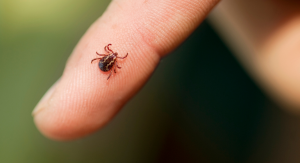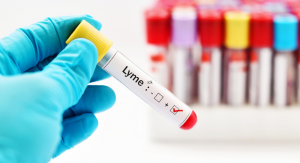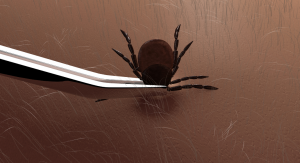“I found a tick! What do I do?” I get this question a lot. Am I a doctor? No. I’m just a survivor. But even now, in late fall, I’m getting daily messages from friends and family who are finding tiny ticks on themselves, their kids, and their pets. And so, I decided that this months blog post would be a quick reminder to the moms of the Seacoast that we have disease-carrying ticks in our midst- even in the cool, wet weather of fall.

I was sick
There’s a reason people reach out to me. I’ve been through hell when it comes to tickborne illness. When I first moved to New England over a decade ago, I was ignorant about ticks. We didn’t have them where I grew up so I had never heard of Lyme disease or other tickborne illnesses. I lived in the Maine woods and worked as an outdoor instructor and hiking guide. Still, no one ever warned me.
It wasn’t until years later when I was working as a teacher that I got really sick. Like, really really sick. One by one my major organ systems shut down. I was seeing a neurologist, cardiologist, rheumatologist for a wide variety of symptoms. No one told me it was Lyme because the (ineffective) test came back negative. I thought I was dying.
I got answers
It wasn’t until desperation took me to an integrative health doctor who got me some real answers. He was able to send my blood for a better test and as we had both guessed, I had chronic Lyme disease and a few other tickborne illnesses. That, combined with working in a moldy school building, had shut down my immune system for good. It was a long road to recovery involving months of antibiotics, antifungals, and diet changes. Now, years later, I still get flare ups and have issues with the disease. But I vowed, I would do my part to raise awareness and do everything I could to prevent those I loved from getting Lyme.

The Seacoast Has Tickborne Illness
According to the CDC, the Seacoast is one of the worst places in the country for Lyme disease. My guess is that most of our readers have had a friend or family contract the disease. But did you know that Lyme is not the only tickborne disease you can contract here? The New Hampshire Department of Health and Human Services reports that in addition to Lyme disease (borrelia), the Seacoast also sees regular cases of anaplasmosis, babesiosis, and Powassan virus which are transmitted by a deer tick (black-legged tick). Now while not all ticks carry these diseases, it’s extremely difficult to know if the tick that bites you is infected. And to deliver more grim news, New Hampshire consistently reports over 50% of sampled ticks infected. Therefore, the best thing to do is prevent a bite in the first place.
Preventing Tick Bites
The CDC is a trusted source for tick bite prevention and lay out some of the following suggestions:
- Treat clothing and gear with permethrin
- Wear Insect Repellent – talk to your doctor about the best product for you and your children
- Treat dogs and cats for ticks and have dogs get the Lyme vaccine – see a veterinarian for specific recommendations
- Check you and your children for ticks daily – look under arms, around the hairline, in the belly button, between legs, behind knees, and around waist
- Shower after being outdoors
What to do when you find a tick
If you find a tick and it’s not embedded in the skin, dispose of it. If it’s embedded in the skin, follow the following guidelines:
- Use fine tipped tweezers to grasp the tick near the skin and firmly pull it out of the skin.
- Place the removed tick and put it in a Ziploc and label it with the date and individual it was on in case it needs to be tested.
- Clean the bite area and monitor for symptoms.

Don’t do this
So many people have given me old-wives tales about how to remove ticks but these are not as effective and can sometimes lead to increase chance of disease (like the tick expelling more saliva and disease).
Do NOT do the following: smother the tick, apply heat, or use nail polish to remove the tick.
What Next
If the tick is a deer tick/black legged tick – it is more likely to carry disease. Use a website like University of Rhode Island’s Tick Encounter to identify your tick. They even have a feature where you can send an photo and they will help you for free!
If the tick is a deer tick/black legged tick, it is possible it could give you Lyme disease – especially if it’s embedded for a day or more. If you suspect this, call your provider and explain your concerns. In New England, with the high rate of Lyme disease, doctors can give a single dose of antibiotic to prevent the full contraction of the disease.
For the extra cautious, it is possible to send the tick out for testing. However, you should be aware that even if a tick tests positive for Lyme, it doesn’t mean you contracted it from it. Some places that will test your ticks with quick turn around are TickReport.com, Ticklab.com, and Tickcheck.com.

Are ticks common this time of year?
Yes, they are. Use University of Rhode Island’s interactive field guide to see the tick activity throughout the year. Unfortunately, ticks are a huge problem here on the Seacoast for most of the year with spring, summer, and fall being the worst times.
I’m not an expert but I am an advocate
I love spending time outdoors. My years of suffering, treating, and fearing ticks and tickborne illness has really had an effect on how I enjoy it. It’s made me cautious and concerned about the diseases my kids can get from our yard and the Seacoast trails. If or when you have questions about ticks and Lyme, I suggest reaching out to the CDC and DHHS website as well as your family doctor. For another Seacoast Moms perspective and a story about what she did when her child got Lyme, check out Lydia’s story.










